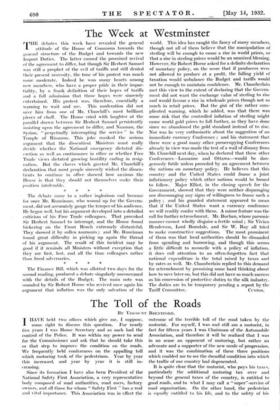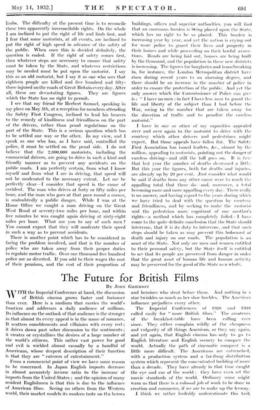The Toll of the Roads
BY VISCOUNT BRENTFORD.
I HAVE held- two offices which give me, I suppose,.
sonic. right to discuss this question. For nearly live years I was Horne Secretary and as such had the control of the Police. It was within my power to send for the Commissioner and ask that he should take this or that step to improve the condition on the roads. We frequently held conferences on the appalling toll which motoring took of the pedestrians. Year by year this increased, and yesr by year it is still in- creasing.
Since its formation I have also been President of the National Safety First Association, a very representative body composed of road authorities, road users, factory. owners, and all those for whom " Safety First " has a real and vital importance. This Association was in effect the
outcome of the terrible toll of the road taken by the motorist. For myself, I was and still am a motorist, in fact for fifteen years I was Chairman of the Automobile Association, and therefore it will be realized that I was in no sense an opponent 'of motoring, but rather an advocate and a supporter of the new mode of progression, and it was the combination of these three positions which enabled me to see the dreadful condition into which the traffic of our country had degenerated.
It is quite clear that the motorist, who pays his taxes, particularly the additional motoring tax over and beyond the general taxes of the country, is entitled to good roads, and to what I may call a "super"-service of road organization. On the other hand, the pedestrian is equally entitled to his life, and to the safety of his limbs. The difficulty at the present time is to reconcile these two apparently irreconcilable rights. On the whole I am inclined to put the right of life and limb first, and I fear that some motorists, at all events, are inclined to put the right of high speed in advance of the safety of the public. When once this is decided definitely, the question is ended. If the right of safety comes first, then whatever steps are necessary to ensure that safety must be taken by the State, and whatever restrictions may be needed nmst be put upon the motorist. I say this as an old motorist, but I say it as one who sees that eighteen people are killed and five hundred and fifty- three injured on the roads of Great Britain every day. After all, these are devastating figures. They are figures which the State has no right to permit.
I see that my friend Sir Herbert Samuel, speaking in my place on May 5th, at a reception for members attending the Safety First Congress, inclined to lead his hearers to the remedy of kindliness and friendlitiess on the part. of the drivers, rather than penal regulations on the part of the State. This is is serious question which has to be settled one way or the other. In my view, and I speak as one who has, as I have said, controlled the police, it must be settled on the penal side. I do not believe that the 2,000,000 motorists, including the commercial drivers, are going to drive in such a kind and friendly manner as to prevent any accidents on the public roads. I am perfectly certain: from what I know myself and from what I see in driving, that speed will not be moderated to the necessary extent. Let me be perfectly clear—I consider that speed is the cause of accident. The man who drives at forty or fifty miles per hour, and the man who goes at that pace round a corner, is undoubtedly a public danger.. While I was at the Home Office we caught a Man driving on the Great West Road at seventy-two miles per hour, and within five minutes he was caught again driving at sixty-eight miles per hour. What are you to say of such men ? You cannot expect that they will moderate their speed in such a way as to prevent accidents.
' There is another point which has to be considered in facing the problem involved, and that is the number of police who are taken away from their proper duties to regulate motor traffic. Over one thousand five hundred police are so diverted. If you add to their wages the cost of their pensions, and the cost of their proportion of
buildings, offices and superior authorities, you will find that an enormous burden is lifting placed upon the State, which has no right to be so placed. This burden is increasing year by year, and yet the nation is crying out for more police to guard their lives and property in their homes and while proceeding on their lawful avoca- tions. Roads are being laid out, houses are being built by the thousand, and the population in these new districts is increasing. The figures for burglaries and housebreaking in, for instance, the London Metropolitan district have risen during recent years to an alarming degree, and there should be an increase in the her of police in order to ensure the protection of the puhlie. And yet the only answer which the Commissioner of Police can give is : " I have no men : in fact I have less men to guard the life and liberty of the subject than I had before the War, owing to the number that are taken away for the direction of traffic and to penalize the careless motorist."
I have in one or other of my capacities appealed over and over again to the motorist to drive with the comtesy which other drivers and pedestrians might expect. But those appeals have fallen flat. The Safety First Association has issued leaflets, &e., almost hy the million, appealing to motorists, pointing out the danger of careless driving—and still the toll goes on. It. is Int: that last year the number of deaths decreased a little. But this year the figures, both for deaths and injuries. are already up by 20 per cent. Just consider what would be said if deaths from any other cause were to reach the appalling total that these do—and, moreover, a total becoming more and more appalling every day. There really is no answer, and having regard to the years during which we have tried to deal with the question by courtesy and friendliness, and by seeking to make the motorist and the pedestrian more cognimint of one another's rights—a method which has completely failed— I have come to the quite definite conclusion that the State should intervene, that it is its duty to intervene, and that such steps should be taken as may prevent this holocaust of death and injury on our roads. The population is an asset of the State. Not only are men and WOIllell ctititled to their personal safety, but the State itself is entitled to see that its people are preserved from danger in order that the great asset of human life and human activity may he preserved for the good of the State as a whole.





































 Previous page
Previous page